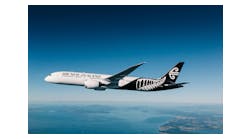The 2011 Dubai Air Show ended with record attendance of more than 56,000 and orders just north of $63 billion. Not bad, I figured after personally reading reports about the show for the first time. However, I learned a few new things over the weekend while watching a newscast on Al Jazeera English regarding the show's highlights that I thought I'd pass along.
No one's arguing that $63 billion isn't an envious number, but what a drop since the 2007 show when orders topped $155 billion. Then again, what a jump since the 2009 show when orders dropped to $14 billion.
But plane orders only tell you part of the story. No surprise, then, that the price of oil continues to be a dark cloud. Sure, a barrel of oil has topped $100 many times before, but it's never been so stubbornly stuck past that point for so long.
Emirates made the headlines on the first day with an order for 50 777-300s from Boeing in a deal that could reach as high as $26 billion. But Tim Clark, the airline's president, said the high price of fuel in the first six months of this year took $1 billion straight off his bottom line. Added up, Clark said the airline spent 50 percent more on fuel in the first six months of this year than it did in the same period of time in 2010. In fact, Clark said that his company's profits would have reached record levels without that cost increase.
"The fact we had a profit at all is amazing," he said.
Clark will use the new Boeings to "retire" around 70 aircraft from his current fleet. The first of the new planes won't start coming until the first quarter of 2015 when he said he hoped "for some equilibrium back into the global economy."
Until then, he suggested that "adaptation" is the key to pretty much any business these days. "The world has changed and we are great opportunists and great optimists," he added.
Traditional patterns of travel where the "European airlines took the Africans to Asia," are gone for good, he said. On the other hand, there are some 7 billion people on the planet "just getting a taste for travel." All to the plus side since many of these people have addresses in fast-growing countries, such as China, India and South America.
He wrapped up his interview by describing his business in an unusual way for a high-ranking executive. "We're economic voyeurs," Clark explained. "We facilitate, we don't create, and we can see what's going on in China and India." The pace of air travel might slow, but it won't go away.
"And that's why we ordered the fifty," he added.




